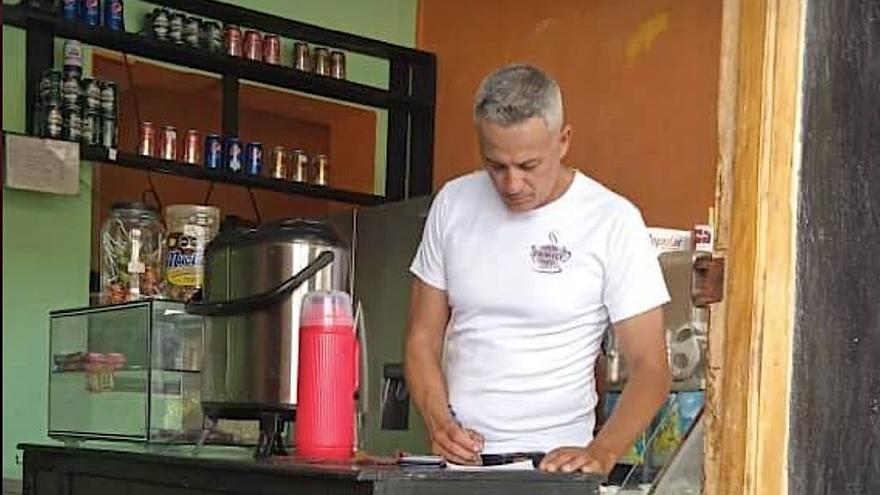
![]() 14ymedio, Havana, 19 May 2023 — Family man and owner of a cafeteria in Camajuaní (Villa Clara), Alexis González exploded this Tuesday in a direct Facebook broadcast that reached thousands of people. Faced with the shortage, bureaucratic obstacles and harassment by inspectors, he asked the authorities for an answer: “Someone explain to me how long the effrontery and lack of respect for self-employed workers will last.”
14ymedio, Havana, 19 May 2023 — Family man and owner of a cafeteria in Camajuaní (Villa Clara), Alexis González exploded this Tuesday in a direct Facebook broadcast that reached thousands of people. Faced with the shortage, bureaucratic obstacles and harassment by inspectors, he asked the authorities for an answer: “Someone explain to me how long the effrontery and lack of respect for self-employed workers will last.”
During the next fifteen minutes, he questioned the treatment that the Government is giving to the self-employed, the increasingly scandalous privileges for MSMEs [micro, medium and small enterprises] and the system of fines, raids and inspections to which small establishments such as his, the Moteros café, located near Independencia de Camajuaní Street, are subjected.
“Before founding Moteros, I started with a cart of popcorn and even that was difficult,” he now tells 14ymedio. “The oil was very expensive, the bag of corn came out at 8,000 or 10,000 pesos, and it did not generate the profit that I needed for my family. So I proposed to my wife that we start a cafeteria.”
With the sale of a small property that González had, he got the initial budget to buy a central space, on the road where vehicles pass from Santa Clara to the Cayería Norte of Villa Clara. “I set up the cafeteria, with the aim of selling pizzas and spaghetti, but lately it has been very difficult to sustain: the raw materials are missing,” he says.
The worst, however, is the siege of inspectors who, in González’s opinion, “do not let anyone live.” “They ask where you got this, that… My explanation? That working is very difficult in Cuba, because 90% of the food that you put on your table is of illegal origin, so imagine what you have to get for a cafeteria.”
To supply Moteros, González turns to the MSMEs : “I made a contract with them, but that doesn’t solve everything.” He says that this exchange is also pursued by the inspectors, who thoroughly review every step taken by the products: “If I sell mayonnaise, I have to spread it on the bread. I can’t buy a jar of mayonnaise, a can of tomato paste, or a bottle of oil and sell it, which I can do with a can of soda. Everything is very absurd,” he complains.
What González expects from the Government is greater flexibility, since there are many self-employed who, like him, do not have the conditions or the money to constitute a MSME: “The authorities have to create a wholesale company where you can buy the products you need. A company that really works, not like what there is now, always empty. That way you could buy supplies and set them a fair price, without abusing customers.”
He points out that the regime’s economic plans have not worked well, and that the strategy — if there is any — has been to repeat a wrong method and not provide a solution to the real problems. “Raising the prices of products, as they have done so many times with the farmers, is of no use,” he summarizes. “What you have to do is help the farmers and the producers in general.”
The self-employed, he says, can no longer hide their annoyance in the face of the privileged treatment given to the MSMEs. “They are the ones who have the most facility for importation. My business can’t be compared to a MSME. The bank doesn’t provide me with a credit, for example. And if it did, I have no chance or money to pay for it. A self-employed worker will never be at that level.”
In Camajuaní, a municipality considered the mecca of footwear in Cuba, the advancement of MSMEs is unstoppable. To the large producers and marketers of shoes, who subject their workers to strict surveillance and are relentless when it comes to setting prices, are added the farmers favored by the regime and, now, the gastronomic establishments.
Jona’s SURL, Calzados Yady’s, Yireh-Ebenezer, El Músico, the “private slaughterhouse” of farmer Yusdany Rojas and a few others chosen: they all have in common, as this newspaper has verified, an intimate relationship with senior officials of the regime — such as Economy Minister Alejandro Gil, President of the National Institute of Hydraulic Resources Inés María Chapman or President Miguel Díaz-Canel himself, who visit them regularly.
For the others, as González affirms, there is a fear that the aparatico — the police, inspectors or State Security — will take action in the matter and demand silence from those who decide, in a personal capacity, to protest against the suffocation of small businesses like theirs.
Translated by Regina Anavy
____________
COLLABORATE WITH OUR WORK: The 14ymedio team is committed to practicing serious journalism that reflects Cuba’s reality in all its depth. Thank you for joining us on this long journey. We invite you to continue supporting us by becoming a member of 14ymedio now. Together we can continue transforming journalism in Cuba.
